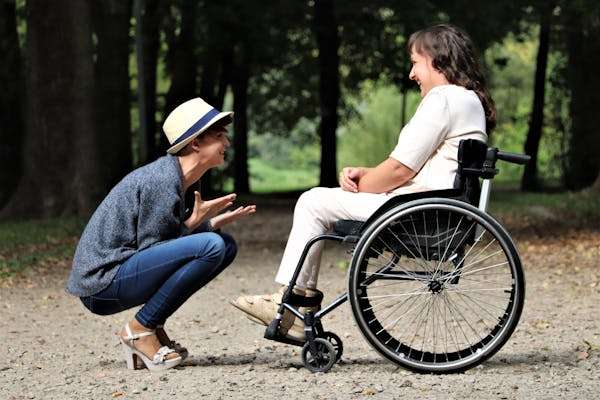Life often presents us with unexpected challenges that test our resilience and strength, and coping with a sudden disability is undoubtedly one of the most profound. Whether it’s the result of an accident, illness, or other unforeseen circumstances, adjusting to life with a disability can feel like navigating uncharted waters. However, within the depths of adversity lies the potential for growth, resilience, and ultimately, flourishing. In this comprehensive guide, we will delve into six key strategies aimed at helping individuals not only cope but thrive in the face of a sudden disability.
Acceptance: Embracing Your New Reality
The journey of living with a sudden disability often begins with acceptance, a process that involves coming to terms with the profound changes that have altered the course of one’s life. Initially, it’s natural to experience a whirlwind of emotions, ranging from shock and denial to anger and grief. However, acceptance is not synonymous with resignation; rather, it is the courageous act of acknowledging what has changed while summoning the strength to forge a new path forward. It requires a profound shift in perspective, from dwelling on what was lost to embracing the possibilities that lie ahead. While acceptance may not come easily or quickly, it is an essential step on the journey toward resilience and flourishing.
Self-Compassion: Being Kind to Yourself
Living with a disability can often bring forth a myriad of negative thoughts and emotions, including feelings of inadequacy, self-doubt, and shame. In such challenges, practicing self-compassion becomes paramount. Self-compassion involves extending the same kindness, understanding, and empathy to oneself that one would readily offer to a beloved friend facing similar circumstances. It entails embracing one’s vulnerabilities with gentleness and acceptance, recognizing that inherent worthiness is not contingent upon physical abilities or perceived limitations. By cultivating a mindset of self-compassion, individuals can nurture resilience, enhance psychological well-being, and foster a deep sense of self-acceptance and self-love.
Adaptation: Finding Creative Solutions
Living with a disability often necessitates adapting to new ways of navigating the world. It requires creativity, resourcefulness, and a willingness to explore alternative approaches to overcome barriers and obstacles. From utilizing assistive devices and adaptive technologies to modifying one’s environment and routines, adaptation is key to enhancing independence, autonomy, and quality of life. Embrace experimentation, innovation, and flexibility as you discover novel strategies for accomplishing tasks and pursuing your goals. Remember, there is no one-size-fits-all solution, so be open to exploring and customizing approaches that best suit your unique needs and circumstances.
Seeking Support: Building a Strong Network
Navigating the complexities of life with a sudden disability can often feel like an isolating journey, but no one should have to navigate it alone. Building a strong support network is essential for both emotional sustenance and practical assistance. Reach out to friends, family members, and support groups who can offer empathy, encouragement, and companionship along the way. Share your experiences, fears, and triumphs with those who understand and validate your struggles. Additionally, consider seeking professional support from therapists, counselors, or experts who can guide you through a challenging TPD claim and provide specialized guidance, resources, and assistance in navigating the challenges of living with a disability.
Empowerment: Taking Control of Your Narrative
Living with a disability can sometimes lead to feelings of disempowerment or a loss of agency over one’s own life. However, reclaiming control of one’s narrative and asserting agency is essential for cultivating a sense of empowerment and self-determination. Refuse to allow your disability to define you or dictate your potential. Instead, focus on your strengths, passions, and aspirations, and advocate for your needs, rights, and accessibility in all aspects of life. Whether it’s in education, employment, or social interactions, strive to create a more inclusive and equitable society that honors and respects the diverse abilities and contributions of all individuals.
Resilience: Bouncing Back from Setbacks
Resilience is the cornerstone of thriving in the face of adversity and living with a disability often demands a steadfast commitment to resilience in the face of numerous challenges and setbacks. While setbacks may be inevitable, they need not define or derail your journey toward growth and flourishing. Cultivate resilience by maintaining a positive outlook, practicing gratitude, and drawing strength from your support network and past experiences of overcoming adversity. Embrace setbacks as opportunities for learning, growth, and refinement, and view them as temporary detours rather than insurmountable obstacles. With resilience as your guiding force, you can navigate life’s ups and downs with grace, fortitude, and unwavering determination.
Coping with a sudden disability is undeniably a challenging and multifaceted journey, but within the crucible of adversity lies the potential for profound growth, resilience, and transformation. Remember, you are not defined by your disability, but by your courage, resilience, and unwavering determination to transcend limitations and live a life of purpose, meaning, and fulfillment. Through perseverance, self-discovery, and the unwavering support of others, you can navigate life’s complexities with grace, resilience, and boundless optimism.

As the editor of the blog, She curate insightful content that sparks curiosity and fosters learning. With a passion for storytelling and a keen eye for detail, she strive to bring diverse perspectives and engaging narratives to readers, ensuring every piece informs, inspires, and enriches.










